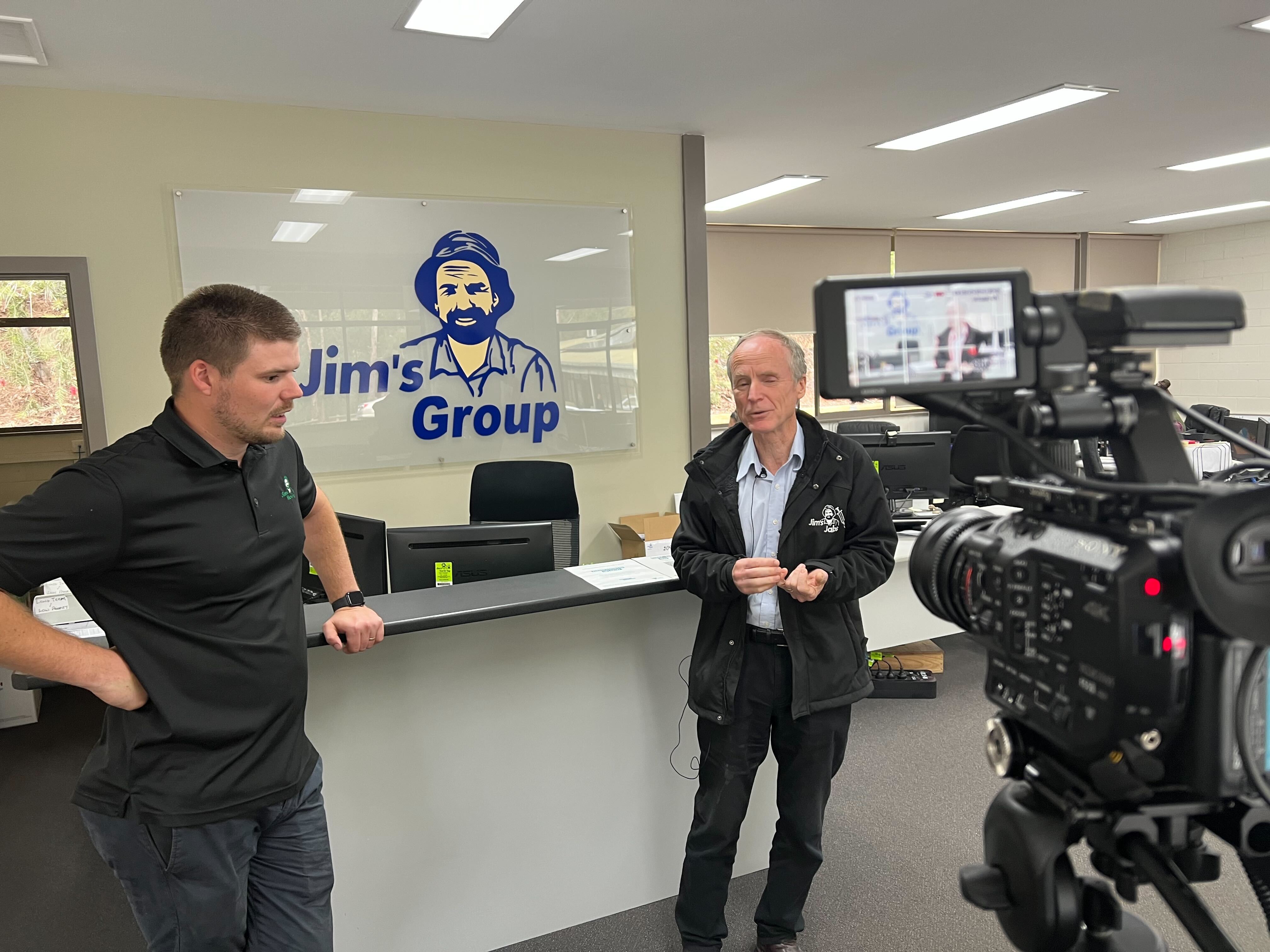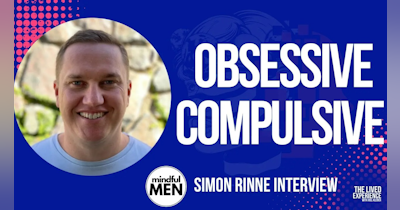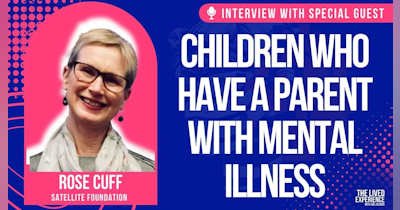Interview with Jim's Group CEO, Jim Penman on Mental Health, and Franchisees
Jim Penman started a part-time gardening business while earning his PhD in history at Latrobe University. He launched a full-time mowing business in 1982 with a $24 investment. He originally aimed only at taking on subcontractors, but his business grew, and he gradually began to specialize in the building up and selling of lawn mowing rounds.
Jim’s Group now has over 4,800 Franchisees and a turnover of approximately $500 million. Jim is very passionate about his research, which you can learn more about www.biohistory.org
Jim is also my boss and friend, I have worked with him for 11 years now and I can 100% verify that he committed to trying to make the world a better place with his research project. Jim has also allowed me to bring TIACS into the group and we also providing funding to them.
JOEL: Why is mental health important to you?
JIM: It's a huge issue for us, because we have contact with so many people, there are nearly 5000 Jim’s franchisees out there—far more than that, if you count employees and so forth.
And it's an issue that comes up all the time. People are failing, people getting complaints, people who are not making the income they should, mental health comes up again and again and again. So, it's a major focus for us.
We're more aware of it more recently. I don't know whether that's because there's more mental health problems, or because people are freer to talk about it than they used to be.
It's brought up a lot like, sometimes if a franchisee gets too many complaints, and they think I should knock them off.
And they say, “Well, it's affecting my mental health and if you really cared about my welfare, you would”.
So that's in a sense, using the mental health thing. Mind you, what I say to them is “Yes, look, I understand getting complaints is does provoke anxiety.
On the other hand, if we let customer service go, and you don't have enough work, and you can't feed your family, that's also going to create anxiety”. So, it's not as simple as that.
What does Jim’s Group do for franchisees regarding this issue?
The biggest thing that we've found is having a sense of connection of community.
For example, when we first started off in Jim’s, we just used to give people leads, and if they had a problem, they'd ring us up.
And we quickly found out that there wasn't enough that what we need to do was run meetings.
So, the franchisees who were near to my office used to come in regularly—we have meetings in my lounge room initially.
And they were happy, the further we got away, the less happy they were. And we realized that meeting regularly with other franchisees is very important in creating a sense of community.
So, it's an opportunity, to learn about the business and an opportunity to connect with other people. And then when they come to meetings, they tend to build bonds, and so they'll ring each other in the evenings.
That's far more important than we thought.
What do you think then there's all this money being thrown at mental health?
I think spending money on psychologists and stuff has value, but I really think the root causes have more to do with community.
And I love one movement—I really love the menshed movement. It’s fantastic because men are less likely to ask for help. But they're less likely to go and see a psychologist or ask for help, but they're more likely to commit suicide.
And that's because we're taught to be, toughen and we can take it in. You don't let anybody know that what's going on. I think anything that builds a sense of community is good.
The biggest thing we think anybody can do is get involved in those kinds of activities. And it doesn't matter what the community is, in a sense.
Now I'm a practicing Christian. So, to me, churches, are important community and my life group within the church and those kinds of connections.
But other people, it might be a sporting club, something like the Men's Sheds, it could be a committee, it could be the CFA—my brother worked for the CFA, who volunteered CFA for many years. And that was good for him.
So, there's many different groups. I think the best thing anybody can do—I don't know if requires government money, but just to get people involved with each other, close friends. So just relationships matter so much.
What about yourself, what do you do for yourself?
I will be one of the happiest people on Earth. Honestly, I've got a fantastically good job—which is exciting.
It's also meaningful too, because it's a mission, I've got 1000s of people 1000s and 1000s, and families out there who are affected by what we do.
And when I bring somebody on a Sunday night, and they talk about how much difference is made to their lives and how much happier they are and how a man seeing his children grow up as you never could have in the past. That is rewarding to an extreme degree.
When I get up in the morning, it's not just a case of out to make money or whatever amount to do something worthwhile.
And the other thing too is that we live in a b2b monos fashion. You know, we talked about my car's worth $10,000.
But the funds that are produced by Jim’s are going into this project of scientific research—which is aiming to look at some of the root causes of addiction and mental health problems and so forth.
So, my life has extreme purpose. That's a very, very important thing. Now, on top of that, I have a great social environment—I have a wife that I'm crazily in love with after 21 years, and that is wonderful.
Not that we don't fight at times, Lisa is quite passionate, but I have a great relationship. Most of my children I get on with, I have good relationships at work, a lot of people, my co-workers, I really appreciate—they're wonderful people.
I'm healthy and fit, I run at least half an hour a day, physical exercise, I maintain my weight. So, I'm very, very good health. All these things matter.
What do you think of a family having good mental health?
There are certain kinds of guidelines and rules about family life, like the family dinner.
For example, now we have a rule in our house list I certainly insist on it is that when you eat together, you eat facing each other, you don't eat the side by side, you sit around the television, phones are banned from the table, Li takes us out and so forth, but I'll confiscate the beat.
Sometimes she can take it.
But you sit there you talk; we always start with family prayer—just a brief one. And we communicate as a family, we go out quite a lot too and it's not expensive, like the local pizza joint.
But one of the great things about that is that you spend time together—you're driving, and then you're sitting waiting with the food.
And then you're eating it and then you're driving it afterwards. And we might go off to cold rock and get some dessert. So that occasion, that sense of occasion.
We would go out more than once a week. It's almost always a family occasion and we do it deliberately. It's a sense of community, is so valuable.
And I think the problems with smartphones and the way they take over is dangerous stuff.
We have certain kinds of rules about limits on what you can do and when you can use them and so forth.
How are your research help with mental health or mental illness issues?
We're doing experiments with rats, subjecting them to mild food restriction—about 25% less food than they would normally eat, which is not, that's not severe, but they don't lose drastic weight—its mind being starved.
And then we look at changes that take place in the physiology in things like their cytokines, their microbes, their proteins, their changes to the epigenetic settings, changes to pheromones, looking at all kinds of things that now the aim of that is to work out a way to reproduce that.
Now, if we can produce a substance, a treatment, which I think we can do reverse that it'll have the effect of reversing maintenance changes.
For example, it will make people more long-term thinking. So, somebody who the issue with most as attitudes to reason people don't control their diet, or exercise is because they're very focused on the short term.
If I have a chocolate or a banana or chips now or soft drink, I'll feel good.
I might feel worse in the in the future—don't worry about that so much. And the same thing with drugs even worse, alcohol, gambling, or all these kinds of problems.
They come because of people seeking to short-term. What this treatment would do is make people more long-term thinking.
So, it's looking at the physiological basis, I do think there has very major potential for reversing some of these changes, which is why even though we support things like beyond blue as an organization, my personal investment is entirely in basic research.
How important do you think your religion is?
I believe in God's heart to have religion if you haven't got any sense of a divine being.
And I have experiences that suggests to me that's not just something made up in my head. But looking on second level, obviously, being a committed believer of any religion is very important.
It gives you a sense of community. Even though committed Christians are minority these days, it's very warming.
And when you are with other Christians, you always have a certain sense of how people are going to behave—the people that I deal with don't tend to be condemned other people so much—more positive.
And then you got the gratitude thing too, we're taught to thank God in all circumstances.
So, for example, one of the reasons that things don't get me down is because I'm always going to look at the positive side, the good things about it.
I'm not getting a quite so with one of my children. She's a wonderful girl, and she's really disciplined, you've got good moral character, and so forth.
So, you always look the positive side of anything. And then, with time you didn't get on with it, so you mend on that one.
Always looking at the positive side. I wake up every morning, I've got my beautiful wife next to me—that makes me so happy.
I love her so much. So sometimes, she annoys me, and I annoy her. And we'll have arguments but overwhelmingly grateful for having her, meeting Lisa 21 years ago was, the best single thing that ever happened to me.
Always the attitude of gratitude. That's very much part of the way Christians think we're always praising, thanking God for all these blessings. Beautiful day, thank you, God for that.
What can you say about Tall Poppy Syndrome?
I don't really mind the tall poppy syndrome. I think it's a sign of Australians are more egalitarian.
And I think somebody who's drives around and switch car and says how rich and how important they are. They're a bit of a t*rd, honestly.
That's true, Australians recognize that, you know, I don't think Australians mind people being successful, but they do mind people are up themselves who think because they've got more money, they're better than somebody else, which is not the case at all.
To learn more about Jim, visit https://jims.net/who-is-jim/













